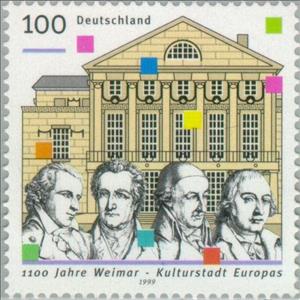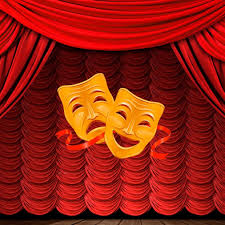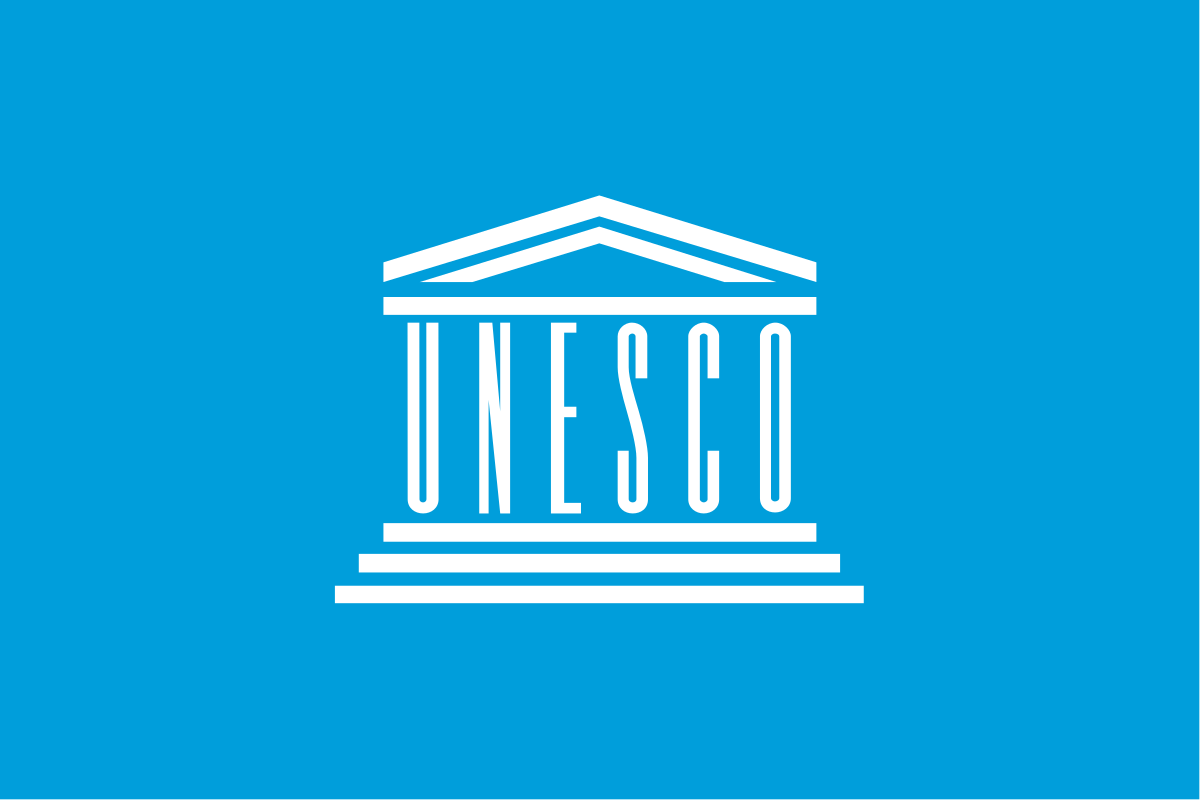Stamp: Schiller, Goethe, Wieland, Herder, German Nationaltheater (Germany, Federal Republic 1999)
Schiller, Goethe, Wieland, Herder, German Nationaltheater (Germany, Federal Republic 1999)
14 January (Germany, Federal Republic ) within release Bora, Katharina von goes into circulation Stamp Schiller, Goethe, Wieland, Herder, German Nationaltheater face value 100 German pfennig
| Stamp Schiller, Goethe, Wieland, Herder, German Nationaltheater in catalogues | |
|---|---|
| Michel: | Mi:DE 2028I |
| Stamp Number: | Sn:DE 2024 |
| Yvert et Tellier: | Yt:DE 1860 |
| Stanley Gibbons: | Sg:DE 2882 |
| Unificato: | Un:DE 1860 |
Stamp is square format.
Also in the issue Bora, Katharina von:
- Stamp - International Year of Older Persons face value 110;
- Stamp - Schiller, Goethe, Wieland, Herder, German Nationaltheater face value 100;
- Stamp - Bora, Katharina von face value 110;
Stamp Schiller, Goethe, Wieland, Herder, German Nationaltheater it reflects the thematic directions:
Famous People refers to the fame and public attention accorded by the mass media to individuals or groups or, occasionally, animals, but is usually applied to the persons or groups of people (celebrity couples, families, etc.) themselves who receive such a status of fame and attention. Celebrity status is often associated with wealth (commonly referred to as fame and fortune), while fame often provides opportunities to make money.
In legal discourse, an author is the creator of an original work, whether that work is in written, graphic, or recorded medium. The creation of such a work is an act of authorship. Thus, a sculptor, painter, or composer, is an author of their respective sculptures, paintings, or compositions, even though in common parlance, an author is often thought of as the writer of a book, article, play, or other written work.In the case of a work for hire, the employer or commissioning party is considered the author of the work, even if they did not write or otherwise create the work, but merely instructed another individual to do so.
Theatre or theater is a collaborative form of performing art that uses live performers, usually actors or actresses, to present the experience of a real or imagined event before a live audience in a specific place, often a stage. The performers may communicate this experience to the audience through combinations of gesture, speech, song, music, and dance. It is the oldest form of drama, though live theatre has now been joined by modern recorded forms. Elements of art, such as painted scenery and stagecraft such as lighting are used to enhance the physicality, presence and immediacy of the experience. Places, normally buildings, where performances regularly take place are also called "theatres" (or "theaters"), as derived from the Ancient Greek θέατρον (théatron, "a place for viewing"), itself from θεάομαι (theáomai, "to see", "to watch", "to observe").
The United Nations Educational, Scientific and Cultural Organization (UNESCO; pronounced /juːˈnɛskoʊ/) is a specialized agency of the United Nations (UN) with the aim of promoting world peace and security through international cooperation in education, arts, sciences and culture. It has 194 member states and 12 associate members,as well as partners in the non-governmental, intergovernmental and private sector. Headquartered in Paris, France, UNESCO has 53 regional field offices and 199 national commissions
An anniversary is the date on which an event took place or an institution was founded in a previous year, and may also refer to the commemoration or celebration of that event. For example, the first event is the initial occurrence or, if planned, the inaugural of the event. One year later would be the first anniversary of that event. The word was first used for Catholic feasts to commemorate saints. Most countries celebrate national anniversaries, typically called national days. These could be the date of independence of the nation or the adoption of a new constitution or form of government. The important dates in a sitting monarch's reign may also be commemorated, an event often referred to as a "Jubilee".





